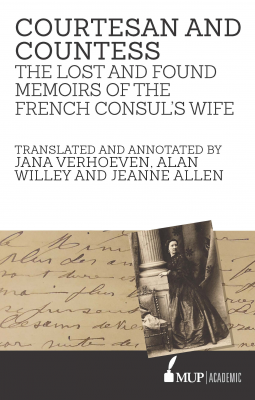
Courtesan and Countess
The Lost and Found Memoirs of the French Consul's Wife
by Jana Verhoeven, Alan Willey & Jeanne Allen
This title was previously available on NetGalley and is now archived.
Send NetGalley books directly to your Kindle or Kindle app
1
To read on a Kindle or Kindle app, please add kindle@netgalley.com as an approved email address to receive files in your Amazon account. Click here for step-by-step instructions.
2
Also find your Kindle email address within your Amazon account, and enter it here.
Pub Date Dec 01 2015 | Archive Date Jun 25 2017
Melbourne University Publishing | MUP Academic
Description
Lost for more than eighty years until discovered by the authors in the attic of a French country manor, these are the unpublished and final set of memoirs from Céleste de Chabrillan.
Jana Verhoeven (lead author) is a researcher and teacher of French literature and history at the University of Melbourne. Her most recent publication is Jovial Bigotry: Max O'Rell and the Transnational Debate over Manners and Morals in 19th Century France, Britain and the United States. Jana has also published a number of articles on nineteenth century French cultural history, including Les deux noms and Petit journal de la fin de ma vie: Céleste de Chabrillan's mémoires inédits.
Alan Willey read Modern Languages at Oxford and taught French at Wesley College Melbourne for over thirty years. He has been researching Céleste de Chabrillan's life since 1998.
Jeanne Allen studied French language and literature at the University of Melbourne and wrote her Master of Arts thesis on a selection of the Australian works of Céleste de Chabrillan. In 1998, she co-translated and annotated Céleste's second set of memoirs, The French Consul's Wife. Jeanne is currently an Associate Professor in Education.
Available Editions
| EDITION | Paperback |
| ISBN | 9780522868845 |
| PRICE | A$59.99 (AUD) |
Average rating from 2 members
Featured Reviews
 Reviewer 153322
Reviewer 153322
Céleste de Chabrillan's life was the stuff of 19th century scandal--registered prostitute at 16, self-educated courtesan and companion of elite men of the Second Empire, author of racy memoirs, wife of a black sheep aristocrat sent as a remittance man to Australia with a ceremonial diplomatic position, observer of Australia's Gold Rush and novelizer of it, author of more memoirs and widow. All that is by her mid 30s and only 1854. Left without a pension and rejected by her in-laws, Celeste returned to France and became the most prolific female playwright of the 19th century, specializing in topical melodramas, owned a theater, befriended Bizet, wrote more novels, ran a mobile ambulance in the Franco-Prussian War, twisted arms to fund an orphanage for children of the Commune, anti-Dreyfusard published by the most powerful Jewish press in Paris. Verhoeven tracked down this unpublished third memoir, covering the second half of the 19th century, and has translated and annotated it--people at the time were less interested in her business and political experiences than her sexy years or Australia, but the memoir is a crucial look inside the overlapping worlds of theaters, government and aristocratic social circles of 19th century France.



